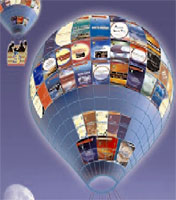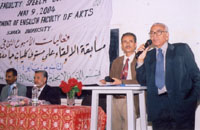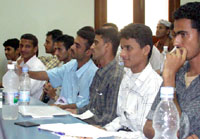
Message of the Symposium on ‘Democracy and National Unity’, Faculty of Education, Sa’adahUphold Democratic Ideals and Institutions [Archives:2003/631/Education]
April 14 2003
 |
 |
 |
Level 4 (English)
Faculty of Education,
Arts and Science
Sa'adah
A two-day symposium (17-18 March) on Democracy and National Unity was organized at the Faculty of Education, Arts and Science under the patronage of Dr Nasser Awlaqi, Rector of Sana'a University. The Dean of the Faculty, Dr Abdul Wasa'a Al Himeiry, welcomed the speakers and underlined the significance of democracy in his opening remarks. Yemen is an old country but a young nation where the spirit of democracy has been steadily growing over the years under the dynamic and forward-looking leadership of President Ali Abdullah Saleh, he said. The need of the hour is to fortify its foundation through public awareness, popular mandate, mass access to education, women's empowerment and strengthening of the institutions that protect people's fundamental rights and ensure the health of democracy in any society. He called upon the students to disseminate democratic awareness in society and contribute to national unity so that a strong, prosperous and united Yemen can make its mark in the comity of nations.
The first session began with recitation of a verse from the Holy Quran. Speaking on the occasion, Dr Mohammad Abdul Karim Barakat, lauded the concept of democratic dispensation in accordance with Islamic tradition. and teaching. While appreciating the point made by Dr Barakat, another participant, Dr Mottahar Siaf laid stress on the essentially humane and tolerant spirit of Islamic precepts for evolving a model of democracy. He cautioned against the fundamentalist fringe hijacking the noble and gentle tradition of Islam.
The second session got started with a poem recited by Yusuf Salem. The topical theme of his poem drew a round of applause from the audience. In his presentation, Dr Hassan Imam, Department of Islamic Studies, supplemented the points raised by Dr Barakat. He made a plea for an indigenous tradition of democracy in the Arab region in that the teachings of the Holy Quran offer an alternative to the Western system of democracy. His point was rebutted by Dr Saleh Shamy, who argued that Islamic teachings can substantially inform and strengthen the Western model rather than run counter to it. What is vitally valid is that the citizens, particularly the educated sections of society should practise the essentials of democracy instead of merely preaching it and become role models for other members of the society. Without an honest and active commitment to the ideals of democracy no system or model can work.
On the following day, the speakers including Dr Fadel Bonaian Mohammad, Dr Abdul Wasa'a Al Himeiry and Dr Ayham A. Yahya threw further light on the links between democracy and national unity)the main theme of the symposium. They said that national unity can't be forged without a public-spirited government elected into office by the popular will of the nation. Only when people value their participation in governance and nation building can they contribute to the maturing of democracy. Democratic system based on equity and fairplay offers ample opportunity to all citizens, particularly women and weaker sections of society for their role in nation building. It is the cementing force for a united nation.
The Vice-Dean of the Faculty, Dr Ayham pointed out the ills in the Westminster model of democracy. He stressed on the significance of public vigilance during elections otherwise the high and mighty elements are apt to derail democracy, and defeat its ideals and goals. He sharply attacked the so-called leading Western democratic countries like the UK and USA for their dictatorial and imperialistic ambitions in the current situation. Each of the presentations was followed by sharp comments, observations and incisive questions. Among others who participated in the discussion were Dr Abdullah Tahir Al Hudaibi and Dr Md Abdullah Ali from Sana'a. In his concluding address, the Dean, Dr Abdul Wasa'a said that the presentations and discussions were provocative, productive and stimulating. He promised that he would line up a series of such interactive sessions on a variety of themes and issues in the future.
——
[archive-e:631-v:13-y:2003-d:2003-04-14-p:education]


